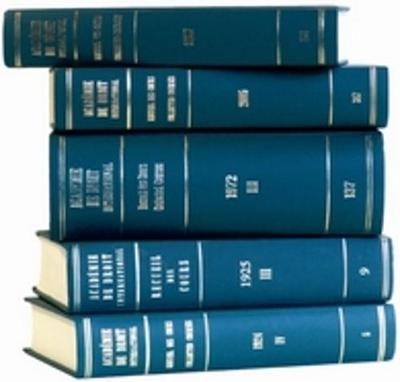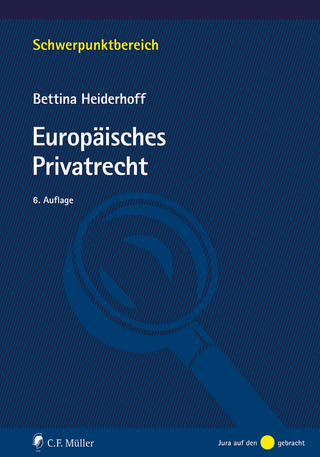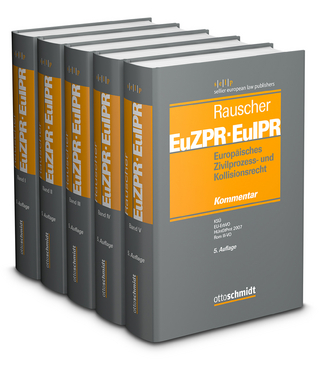
Recueil des cours, Collected Courses, Tome 380
Martinus Nijhoff (Verlag)
978-90-04-32131-1 (ISBN)
L’arbitrage dans l’espace OHADA, par P.-G. Pougoué, professeur émérite à l’université de Yaoundé II.
The Quest for Legal Certainty in International Civil Cases, by T. Kruger, Professor at the University of Antwerp.
Co-publication with: The Hague Academy of International Law. Hans (Johannes Hendrik Albert) van Loon, born in Utrecht, Netherlands, 15 April 1948. Studied law and sociology, University of Utrecht (1966-1971), and international law and international relations, University of Leyden (1971-1972), Graduate Institute, Geneva (1972-1973). Trainee, Directorate Legal Affairs Council of Europe, Secretariat European Commission of Human Rights, Strasbourg (1973). Practised law before the Supreme Court of the Netherlands and acted before the European Commission and Court of Human Rights (1974-1978/1979). Secretary (since 1978), First Secretary (1988) at the Permanent Bureau of the Hague Conference on Private International Law. Secretary General of the Hague Conference (1996-2013). Executive Secretary, Netherlands Standing Government Committee on Private International Law (1978-1996). Deputy Judge, District Court of The Hague (1984-1996). Secretary, Netherlands Branch of the International Law Association (ILA) (1977-1992) ; Rapporteur 63rd and 64th ILA Conferences ; (Co-)Rapporteur Netherlands Branch (1983, 2013). Member of the European Group on Private International Law (GEDIP) (since 1991). Honorary member of the Asociación Americana de Derecho Internacional Privado (ASADIP) (since 2007). Member of the Institut de droit international (since 2013; Associate Member 2009). Expert-consultant to the Governments of Costa Rica (1989), Romania (1991 and 2000), Albania (1992), the Senate of Paraguay (1996), the Governments of Guatemala (2005), Cambodia (2008), and to UNICEF and UNHCR (1993). Doctor honoris causa, University of Osnabrück (2 November 2001). Paul-Gérard Pougoué, né le 8 mars 1949, à Bakou (Cameroun). Agrégé des Facultés de droit (Paris, 1982), et professeur émérite à l’université de Yaoundé II. Grâce à sa riche expérience d’enseignant-chercheur, il est appelé à diriger plusieurs jurys d’agrégation du Conseil africain et malgache pour l’enseignement supérieur (CAMES), section droit privé et sciences criminelles ; à siéger dans les instances de décision d’institutions internationales dont l’AUF (1993-2001), la Maison des sciences de l’homme d’Aquitaine (2001-2010), l’Institut pour le développement de l’enseignement supérieur francophone, le Conseil de l’organisation internationale des palmes académiques (OIPA) du CAMES ; à être rapporteur général du XVIIe Congrès mondial du droit du travail et de la sécurité sociale, Uruguay, 3-5 septembre 2003 ; à être parrain de la Ve promotion (2004) de la formation générale en droits humains sous la coordination scientifique de la Chaire UNESCO des droits de la personne et de la démocratie, université d’Abomey- Calavi, République du Bénin. Depuis 2009, il est membre de la commission d’experts pour l’application des conventions et recommandations de l’OIT. En même temps, il participe à l’administration scolaire et universitaire. Il a été, entre autres, 1989-1993, doyen de la faculté de droit et sciences économiques de l’ex-université de Yaoundé ; 1993-1996, conseiller technique du recteur de l’université de Dschang ; 1996-1999, doyen de la faculté des sciences juridiques et politiques, université de Dschang ; 1998-2012, vice-recteur de l’université de Yaoundé II ; 2012-2015, Secrétaire général du ministère des Enseignements secondaires du Cameroun. Deux ouvrages, rédigés par ses disciples, collègues et aussi pour lui render hommage, lui ont été remis en juillet 2015 : L’esprit du droit africain, Mélanges Paul-Gérard Pougoué, Wolter Kluwer, Paris, 2014 ; L’obligation, Etudes Paul-Gérard Pougoué, l’Harmattan, Yaoundé, 2015. Il a reçu plusieurs distinctions honorifiques, notamment : – Grand Officier de l’Ordre de la Valeur (Cameroun) ; – Officier de l’Ordre National du Mérite (France) ; – Officier de l’Ordre national de la République du Bénin ; – Commandeur des palmes académiques de l’Organisation internationale des palmes académiques (OIPA) du Conseil africain et malgache pour l’enseignement supérieur (CAMES) ; – Diplôme d’honneur de l’Organisation pour l’harmonisation en Afrique du droit des affaires (OHADA). Thalia Kruger, born on 22 January 1976 in Cape Town. Studied law at the University of Stellenbosch, where the first encounter with private international law came from the Professor of Public International Law, Gerhard Erasmus. The hybrid nature of South African law (as a mixed legal system) and the importance of respecting fundamental rights were seminal in the law education. The last semester of studies took the form of the exchange programme at the University of Leuven, where she remained to do a PhD on the civil jurisdiction rules of the European Union and their influence on third States, under the supervision of Hans Van Houtte (published by Oxford University Press). Also served as a recording secretary and consultant for the Hague Conference on Private International Law, particularly on the judgments project and the start of the project on choice of law. After her PhD, worked at a non-profit organization to give legal advice in international family matters. Taught international commercial transactions, international arbitration and conflict-of-laws at the University of Cape Town (2007-2008). Worked on EU-funded research projects on international child abduction and religious diversity in international family law (2009 and 2010). Professor of Private International Law (since 2010) at the University of Antwerp. Her research continues to focus on various aspects of private international law, especially international and European civil procedure and international family law. This takes place individually, with colleagues and in European consortia. Honorary research associate at the University of Cape Town and co-teaches international commercial transactions there. Continues to give trainings to European judges on private international law. Member of the editorial boards of the Belgian Tijdschrift Internationaal Privaatrecht, Droit de la Consommation and B-Arbitra and a member of the Advisory Board of the Flemish Central Authority for Adoption. Was part of the European Commission’s expert group on the Recast of the Brussels II bis Regulation.
The Global Horizon of Private International Law, by J. H. A. van Loon, Former Secretary General of The Hague Conference.
Excerpt of table of contents:
Chapter I. The development of private international law against the backdrop of the evolving nation-State (Nos. 1-25)
A. Origins and early development of private international law (Nos. 1-5)
B. Birth of the Hague Conference on private international law (Nos. 6-7)
C. Establishment of the Hague Conference as an international organization – early innovations (Nos. 8-17)
D. Globalization – its effects on the nation-State (Nos. 18-25)
Chapter II. The impact of globalization on the development of private international law (Nos. 26-83)
A. Rising profile, proliferation of sources, new approaches (Nos. 26-34)
B. Commerce and trade : party autonomy within limits (Nos. 35-59)
C. Families and children : direct transnational institutional co-operation
and interaction with human rights (Nos. 60-83)
Chapter III. Global challenges for private international law on the horizon (Nos. 84-149)
A. People on the move (Nos. 87-104)
B. Environment and climate change (Nos. 105-149)
Some general conclusions.
L’arbitrage dans l’espace OHADA, par P.-G. Pougoué, professeur émérite à l’université de Yaoundé II.
Excerpt of table of contents:
Prolégomènes: Place de l’arbitrage dans la stratégie de l’OHADA
Section I. Avant l’avènement de l’OHADA
Section II. Depuis l’avènement de l’OHADA
Chapitre I. Cadrage général de l’ordre juridique arbitral dans l’espace OHADA
Section I. Unification du régime juridique de l’arbitrage
Paragraphe I. Unification de la notion de l’arbitrage
Paragraphe II. Absolutisme de l’unité de régime juridique de l’arbitrage dans l’espace OHADA
Section II. Simplification du domaine de l’arbitrage
Paragraphe I. Approche simplifiée de l’arbitrabilité objective
Paragraphe II. Approche simplifiée de l’arbitrabilité subjective
Chapitre II. Mise en oeuvre de la justice arbitrale dans l’espace OHADA
Section I. Principe matriciel de liberté
Section II. Principe matriciel de sécurité juridique
Paragraphe I. Justice arbitrale, justice à part entière
Paragraphe II. Justice arbitrale, justice à efficacité renforcée
Annexe I : Traité OHADA
Annexe II : Règlement d’arbitrage de la CCJA du 11 mars 1999
Annexe III : Acte uniforme du 11 mars 1999 relatif au droit de l’arbitrage
Annexe IV : Règlement d’arbitrage d’un centre privé d’arbitrage (Arbitrage régi par l’Acte uniforme relatif au droit de l’arbitrage) : Cas du Centre permanent d’arbitrage et de médiation du centre africain pour le droit et le développement (CPAM – CADEV), Douala
Bibliographie.
The Quest for Legal Certainty in International Civil Cases, by T. Kruger, Professor at the University of Antwerp.
Excerpt of table of contents:
Introduction
Chapter I. What is legal certainty?
A. The starting point
B. Objective and subjective legal certainty
C. Legal certainty on which level?
D. Legal certainty for whom?
E. Legal certainty by whom?
F. Legal certainty and other principles or ideals
G. Concluding words
Chapter II. Legal certainty and the troubled history of private international law
A. Why we apply foreign law
B. The history of private international law
C. The US approach to conflict of laws
D. Developments in EU private international law
E. The application of foreign law
F. Concluding words
Chapter III. Seeking the best connection
A. Connections in family law: proximity versus stability
B. The best connections for obligations
C. Choice as a connection guaranteeing legal certainty
D. Protection of parties in a weak (bargaining) position
E. Country of origin?
F. Principle of recognition
G. Closer connection/better law: escape clauses
H. Concluding words
Chapter IV. Corrections and exceptions to the connection
A. Classification and reclassification
B. Renvoi
C. Public policy
D. Mandatory rules
E. Evasion of the law
F. Free movement/trade-related policy
G. Harmonization/unification
H. Concluding words
Chapter V. Litigation planning and strategies
A. The best connection for purposes of jurisdiction: strict rules or flexibility?
B. Parallel proceedings
C. Concluding words
Chapter VI. Recognition and enforcement
A. General
B. Enforcement
C. Recognition and the applicable law test (contrôle de la loi applicable)
D. Concluding words
Conclusions and proposed solutions
A. The best connections
B. Exception
C. Final words
Bibliography; Cases; Books and chapters in books; Journal articles; Legislation.
| Erscheinungsdatum | 15.12.2016 |
|---|---|
| Reihe/Serie | Collected Courses of The Hague Academy of International Law - Recueil des cours ; 380 |
| Sprache | englisch; französisch |
| Gewicht | 792 g |
| Themenwelt | Recht / Steuern ► EU / Internationales Recht |
| Recht / Steuern ► Privatrecht / Bürgerliches Recht ► Internationales Privatrecht | |
| ISBN-10 | 90-04-32131-4 / 9004321314 |
| ISBN-13 | 978-90-04-32131-1 / 9789004321311 |
| Zustand | Neuware |
| Informationen gemäß Produktsicherheitsverordnung (GPSR) | |
| Haben Sie eine Frage zum Produkt? |
aus dem Bereich


